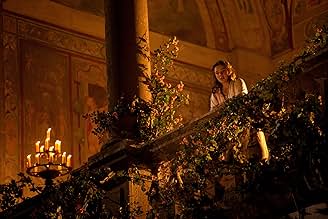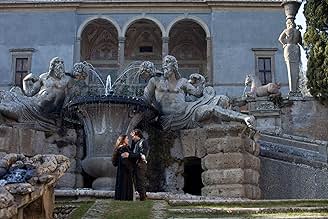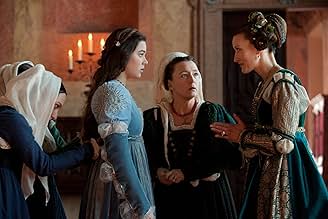Ajouter une intrigue dans votre langueRomeo and Juliet secretly wed despite the sworn contempt their families hold for each other. It is not long, however, before a chain of fateful events changes the lives of both families fore... Tout lireRomeo and Juliet secretly wed despite the sworn contempt their families hold for each other. It is not long, however, before a chain of fateful events changes the lives of both families forever.Romeo and Juliet secretly wed despite the sworn contempt their families hold for each other. It is not long, however, before a chain of fateful events changes the lives of both families forever.
- Réalisation
- Scénario
- Casting principal
- Récompenses
- 2 victoires et 2 nominations au total
- Second Capulet Servant
- (as Marcus Cotterell)
Avis à la une
As a lover of Shakespeare I thoroughly enjoyed the film and feel it's a good introduction for youngsters.
it's a fabulous movie if you love romance and drama and I would thoroughly recommend it.
That's about the best that can be said for it. Fellowes, the screenplay writer, has actually written some new scenes that are not bad examples of blank verse in the Elizabethan style, but they do not have the genius of Shakespeare, and the new scenes don't add much to the story. Replacing Shakespeare's words with his own, which he does far too often, invariably results in poorer and less interesting lines.
Unfortunately, the leads aren't persuading anyone that they are in love, and our attention is drawn instead to some good performances by the supporting cast, especially Damian Lewis's Capulet, which I think is the best performance by anyone as Capulet on screen ever.
So, generally, apart from Lewis, you are much better off watching Zeffirelli's film.
But let's face it; Elizabethan Theatre is an entirely different writing medium to modern film adaption. There are a number of things that had to happen in those days. Notice they say 'I die' every time someone dies? They talk about their feelings an exceptional amount? And there are other near invisible things that would be entirely different. Shakespeare may have been a genius, but if you pulled up an unknown script of a similar level of genius from this era and made a word for word film, I doubt you could expect a great audience reaction. I've seen kids literally sleep through Polanski's Macbeth and even shrug at Zeffirelli's Romeo and Juliet (except when they were noting the lead's similarities to Zefron), yet be highly engaged by the stage performance of the play.
Visually, this film is utterly gorgeous. Whoever chose the locations deserves a french kiss from the world. From the first shots of Juliet running in her orange dress, the audience is stunned by the use of colour and scenery. The costumes were great (I don't think anyone was complaining when we saw a gorgeous Douglas Booth is an open white shirt chiseling away). The hair was to die for and the acting wasn't so bad as everyone makes out. Fact is, everyone's used to it being acted VERY Shakespearean. Which isn't how films work. If you're asking for that style of acting, you ought to see the play and burn the movie. The actors here took a more naturalistic approach, which seems flat, but that's probably because it's naturalistic and this is Elizabethan theatre in a period adaption for a 21st century audience. Are we seeing where some things are bound to get tangled?
That all said, there are two things that I can't justify:
- Far too much kissing. Like all the time. It felt like too much sometimes. A lot. This is probably where people see the lack of chemistry, because the kisses seem to come out of nowhere, are accompanied with virtually no crescendo musical masterpieces or great camera shots, and are usually cock-blocked by the nurse.
- Unless your students are well versed in the play, this shouldn't be the go to for schools studying Romeo and Juliet. Let's face it; a lot of kids don't exactly read the whole play, might write things in their essays that only happened in the movie if they watch it. The thing that everyone complains about (the adding of lines) is only truly detrimental here. The other versions (Baz's and Zeffirelli's) only omitted things, rather than adding things, and is a lot safer for educational purposes.
If you're not studying it; if you haven't studied it to the point at which added lines would make you feel ill; if you aren't an absurd prat about purist R&J (keep Shakespeare Shakespearean? I don't even...), then this is a good movie. And Booth is delectable. Always.
The "woe" in this umpteenth adaptation of Romeo and Juliet over the last 400 years is that the titular lass, as played by Hailee Steinfeld, is weakly acted with immaturity, poor elocution, and disappointing physical presence. Add to that another woe: Douglas Booth's Romeo is prettier than Steinfeld with only slightly better articulation.
So, the outdoor production I saw this summer outflanked director Carlo Carlei's uneven take. However, for sets and cinematography, his production is beautiful, having been lovingly filmed in Verona. The ancient estates are astonishingly effective as horses race past old bricked walls and lovely ladies act beneath frescoes and columns that boast of nobility.
Yet the real reason to see this new production is Paul Giamatti's Friar Laurence, a benign manipulator undone by forces beyond his control. Giamatti's range from sweet confessor and cupid to perplexed operative is masterful. Look for his Oscar nomination for best supporting actor.
Lesley Manville as the Nurse is second only to Giamatti, a loving servant with a twinkle and a deep understanding of the lethal games. In fact, most of the supporting players such as Damian Lewis's Lord Capulet are welcome pros next to the amateurish leads.
The film, while featuring the besieged friar, also does a successful job highlighting the egregiously intense hormonal urges of young men: Tybalt (Ed Westwick) and Mercutio (Christian Cooke) have the feral ferocity of doomed warriors. Even the more placid Count Paris is waiting to let his inner soldier take over in the revenge category.
Writer Julian Fellowes bastardizes some of Shakespeare's glorious dialogue (why would anyone try to improve on the best?) and even adds rogue lines, albeit in the Elizabethan mode, such as "The road to hell is paved with good intentions." Now that is not Shakespeare!
But the basic story is still the essence of intelligent soap opera, and for its endurance, even with weak leads, I am grateful. And that cinematography makes me long to return to fair Verona.
Le saviez-vous
- AnecdotesLily Collins was the original choice for Juliet but dropped out due to scheduling conflicts. Hailee Steinfeld later replaced Collins.
- GaffesJust before the balcony scene Romeo says "He jests at scars that never felt a wound" which is an original line from the play. However, in the play this line is in reference to a series of jests Mercutio shouts at this time about his love for Rosaline. All the jests were cut from the movie, so having Romeo comment about them doesn't make sense.
- Citations
Romeo: If I profane with my unworthiest hand, This holy shrine: my lips, two blushing pilgrims, ready stand, to smooth that rough touch with a tender kiss.
Juliet: Good pilgrim, you do wrong your hand too much. Which mannerly devotion shows in this, for saints have hands do touch. Palm to palm is holy palmers' kiss.
Romeo: Have not saints lips and holy palmers too?
Juliet: Ay, pilgrim, lips that they must use in prayer.
Romeo: O, then, dear saint, let lips do what hands do. They pray, grant thou, lest faith turn to despair.
Juliet: But, Saints do not move their palms for prayers' sake.
Romeo: Then move not. While my prayer's effect I take.
[kiss]
Romeo: Thus from my lips, by yours, my sin is purged.
Juliet: Then have my lips the sin that they have took.
Romeo: Sin from thy lips? O trespass sweetly urged! Give me my sin again.
[kiss]
- ConnexionsFeatured in Weekend Sunrise: Épisode datant du 8 février 2014 (2014)
- Bandes originalesL'Amor Dona Ch'Io Te Porto
Anonymous, late 15th Century
Performed by Ensemble La Rossignol
P 2003 Tactus Records - Licensed by
Machiavelli Music Publishing
Meilleurs choix
- How long is Romeo & Juliet?Alimenté par Alexa
Détails
Box-office
- Montant brut aux États-Unis et au Canada
- 1 162 635 $US
- Week-end de sortie aux États-Unis et au Canada
- 520 116 $US
- 13 oct. 2013
- Montant brut mondial
- 2 966 268 $US
- Durée1 heure 58 minutes
- Couleur
- Mixage
- Rapport de forme
- 2.35 : 1
Contribuer à cette page











































